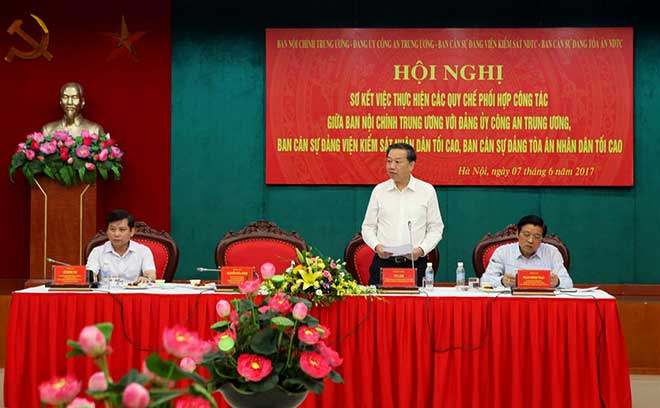Procedure-conducting agencies asked to strengthen coordination, improve effectiveness in fighting corruption
PSNews-On June 7, in Hanoi, a conference was held to review the implementation of the regulations of coordination among the Central Commission for Internal Affairs and the Central Public Security Party Committee, the Party Committee of the Supreme People's Procuracy , theParty Committee of the People's Supreme Court.
 |
The event saw the participation of Senior Lieutenant General To Lam, Member of the Politburo, Minister of Public Security, Deputy Head of the Central Steering Committee for Anti-Corruption; Mr. Nguyen Hoa Binh, Member of the Secretariat of the CPV Central Committee, Chief Judge of the Supreme People's Court, Member of the Central Steering Committee for Anti-Corruption; Mr. Phan Dinh Trac, Member of the Party Central Committee, Head of the Central Commission of Internal Affairs, Standing Deputy Chairman of the Central Steering Committee for Anti-Corruption; Mr. Le Minh Tri, Member of the Party Central Committee, Chairman of the Supreme People's Procuracy, Member of the Central Steering Committee for Anti-Corruption.
Over the past years, Public Security Forces, Procuracy agencies and Courts at all levels have focused on implementing key plans and tasks in the sector and the Central Steering Committee for Anti-Corruption conclusions.
The Central Commission for Internal Affairs has gradually well performed its functions of the coordinator , directing agencies to solve difficulties and problems and successfully investigate serious and complex cases of corruption as well as actively grasp the situation, difficulties and problems to advice the Steering Committee to give appropriate solutions.
In particular, in 2016 and the first 6 months of 2017, the Investigation Department of the MPS concluded the investigation and proposed to prosecute 11 cases with169 accused.
At the meeting, delegates discussed issues to raise effectiveness of the coordination among the agencies in implementing internal affairs and anti-corruption.
Speaking at the event, Minister Lam acknowledged and praised the efforts made by the agencies in the past time.
Minister To Lam also emphasized the following tasks:
First, to continue coordination in researching, advising and proposing the Party and State to issue mechanisms and policies on internal affairs and anti-corruption; effectively implement the Focused Working Program of the Central Steering Committee on anti-corruption in 2017.
Second, to seriously implement the directions of the General Secretary and the head of the Central Steering Committee for Anti-Corruption, focusing on overcoming limitations, creating greater unity and consensus of the procedure-conducting bodies while still ensuring the leadership of the Party.
Third, the Central Commission for Internal Affairs together with the procedure-conducting bodies should strengthen coordination in reviewing, studying, amending and supplementing Party documents and provisions of laws related to investigation, prosecution and adjudication of corruption cases, especially those relating to damage assessment, asset valuation, asset recovery and judicial assistance in extraditing and revoking corrupted assets from foreign countries.
Fourth, to strengthen coordination among leaders of the procedure-conducting bodies and the Central Commission for Internal Affairs to swiftly solve difficulties and problems emerging in handling complicated and lengthy cases. The organization of inter-sector meetings aims to agree on perceptions and applications of the laws, ensuring the strict handling of the case, on the basis of the laws, without interfering with the independence of each agency or person competent to conduct the proceedings.
Fifth, to promote coordination among agencies in reviewing and evaluating the leadership and direction over the investigation, prosecution and judgment of the tried major and complex cases to draw lessons for more effective coordination among bodies conducting legal proceedings, thereby to take measures to enhance and improve the effectiveness of the implementation of the coordination regulations in the coming time.
Finally, to raise the effectiveness of anti-corruption activities in agencies, units and localities, and enhance corruption prevention capabilities of the political system and the Party committees of local agencies.
